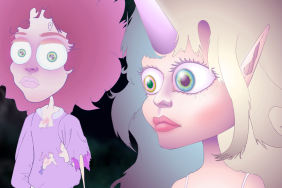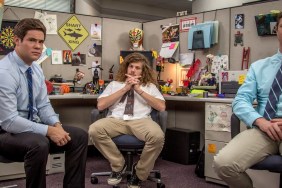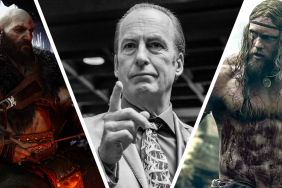
In the Aloha press notes writer/director Cameron Crowe (Almost Famous, We Bought a Zoo) says the movie is “about second chances at life.” Maybe that’s how Crowe sees it, but that’s sort of the sickly sweet Cameron Crowe way of looking at things, which is sort of the biggest issue facing this movie.
The more realistic approach to Aloha is to recognize it as a film saying, “Life is shitty, people are shitty, and if you can find any measure of happiness in this shitty existence hold on and don’t let go.” I don’t say this to suggest there’s anything wrong with this sentiment. In fact, I agree with it. However, in the context of this film it serves as a conflicted approach. Crowe lacquers on a sugary facade over some rather — I don’t want to say “dark” — tough life lessons, but it takes more than constant, emo guitar tunes and Hawaiian words you learned in a book you read one time to solve a shitty situation. In short, the solution to life’s shittiness can’t be solved by a cute song and a quote.
In truth, I’m not sure Crowe ever really knew what this film was about as he kicks things off with voice over and back-story introducing us to Brian Gilcrest (Bradley Cooper), a one-time weapons consultant now serving as a contractor on his way to Hawaii to serve at the leisure of Carson Welch (Bill Murray), a billionaire striking a deal with the US military to launch a satellite into space. A deal needs to be struck with the Hawaiian locals and since Brian used to blah, blah, blah…
To say none of that matters is true, but without it I guess we don’t get Brian to Hawaii where he was previously stationed and abandoned his girlfriend Tracy (Rachel McAdams) thirteen years ago. As it so happens, Tracy is now married with two kids (Danielle Rose Russell and Jaeden Lieberher) and, wouldn’t you believe it, there she is, right there on the tarmac as Brian is stepping off his plane. Also there to greet Brian is the uptight, by-the-books Major Allison Ng (Emma Stone), assigned as Brian’s “watchdog”.
Over the next five days Brian will bond with Allison, reunite with Tracy, become conflicted when dealing with the locals and about two-thirds of the way through Crowe offers up a montage of Brian and Allison walking the streets of Hawaii that should have been accompanied by flashing red lights, marking the moment the film loses any chance of being very good.
Crowe paints himself into a corner by introducing a convoluted set of reasoning as to why Brian is on the island in the first place and he feels beholden to telling that story and using it to bring his characters together, tear them apart and bring them back together again. It’s as if the movie has hold of its audience by both hands, tugging us right and left and right and left to the point our brain has banged against the inside of our skull so many times we don’t know which way is up.
It’s unfortunate because the cast is incredibly good. Many scenes spark to life, thanks largely to a look or gesture from either Cooper, Stone or McAdams, but it’s merely a fragment of moments before everything goes off the rails. In fact, this film feels like a memory box of fragments from Crowe’s career, a hodgepodge of past successes from the likes of Say Anything…, Jerry Maguire and Almost Famous. These fragments, however, are held together so cheaply, mostly relying on some overly sentimental acoustic tune that sounds no different than the last one.
Then there’s the title, an allusion to the setting and the rich history of Hawaii and its people. In some respects Crowe really nails this, but for the most part it feels like a movie where he is just tossing in things he read in a book one time. One scene features Brian and Allison walking to negotiate a deal with Dennis “Bumpy” Kanahele, a Native Hawaiian activist going by his actual name in the film. On the way, in mid-argument, the two are moved by the sounds of nature around them and Allison says, “This place has a lot of ‘mana’.” It’s a scene that’s equal parts magical and stomach-churning. It’s easy enough to recognize Allison is a good egg, but anyone that has to consistently remind everyone she meets that she’s one-quarter Hawaiian is hiding something. More to the point, tell me why Allison Ng couldn’t have been played by an actual Hawaiian. Someone that didn’t need to constantly remind people about her heritage. It’s this level of falseness that reverberates throughout the entire movie.
Ironically enough, the scene referenced above also features the film’s greatest moment, a moment where Brian lets loose concerning a past relationship and adds, “Nobody wants to live where they are, they all want to be in a fantasy.” It’s a line the speaks to the reality of today’s society as much as it speaks to Brian’s cynicism, especially when only moments later he’s caught up in admiring the “mana” of his surroundings. There’s something there and it pops up here and there, throughout the entire film, which is what makes Aloha so damned frustrating.
I can’t bring myself to dislike this movie, but at the same time I can’t say I liked it or would recommend it. I do think people will like it, but upon close reflection I think most will see its flaws, mostly because they come crashing down on you over the course of the film’s final third, which is truly an absolute train wreck.









